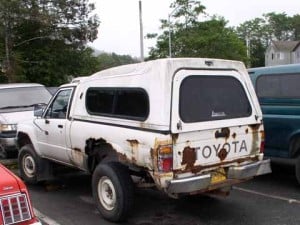Toyota Recall for Rust Issue
Toyota’s Rust Issues: A Look Back and Forward
If you’re over a certain age, you probably remember when Toyota was known for its body problems. A Toyota would last and last—but only if you kept patching it, or lived in a state that didn’t inspect for rust.

Times have changed, and so has automotive technology. Today’s Toyotas are no longer the rust buckets of the 70s and 80s. However, they are not immune to rust and corrosion problems either.
The 2014 Toyota Sienna Recall
In 2014, Toyota issued a recall for 450,000 Sienna minivans from the 2004-2011 model years in salt belt states. According to Autonews.com:
The recalled Siennas are at risk for rust corrosion in the spare tire assembly cable, caused by faulty water splash protectors. Corrosion results from high concentrations of road salt, which reach the spare tire assembly cable when the splash protectors fail. Some of the recalled 2004-10 Siennas were also involved in an April 2010 recall, which included the addition of a water splash protector and an anti-rust agent. These vehicles may have insufficient rust protection.
If you own a Toyota Sienna from the affected model years, it’s crucial to follow up on this recall if you haven’t already.
Why Rustproofing Is Essential
Whether you own a Sienna or not, a good rustproofing treatment is essential, especially in areas like New Hampshire. Standard factory rustproofing measures may suffice in milder climates, but our harsh winters demand more.
The Canadian Automobile Association and the Canadian Army both concluded that aftermarket rustproofing extends the life of vehicles and reduces repair costs. This is especially true in regions with heavy salt use on roads.
Affordable Rustproofing Options
The Rust Stop Pro, located in Concord and Deering, offers several rustproofing options, including the acclaimed RS3000. Prices start at $139 for most cars and $159 for most pickup trucks and SUVs.
When you compare these prices to the cost of repairing or replacing rusted body panels, the value is clear. Keep in mind, body rust is just the beginning. Brake lines, exhaust systems, frames, and even plastic and rubber components can be destroyed by modern deicing mixtures.

 Buy US Direct
Buy US Direct Buy CA Direct
Buy CA Direct Buy EU Direct
Buy EU Direct Buy DE Direct
Buy DE Direct